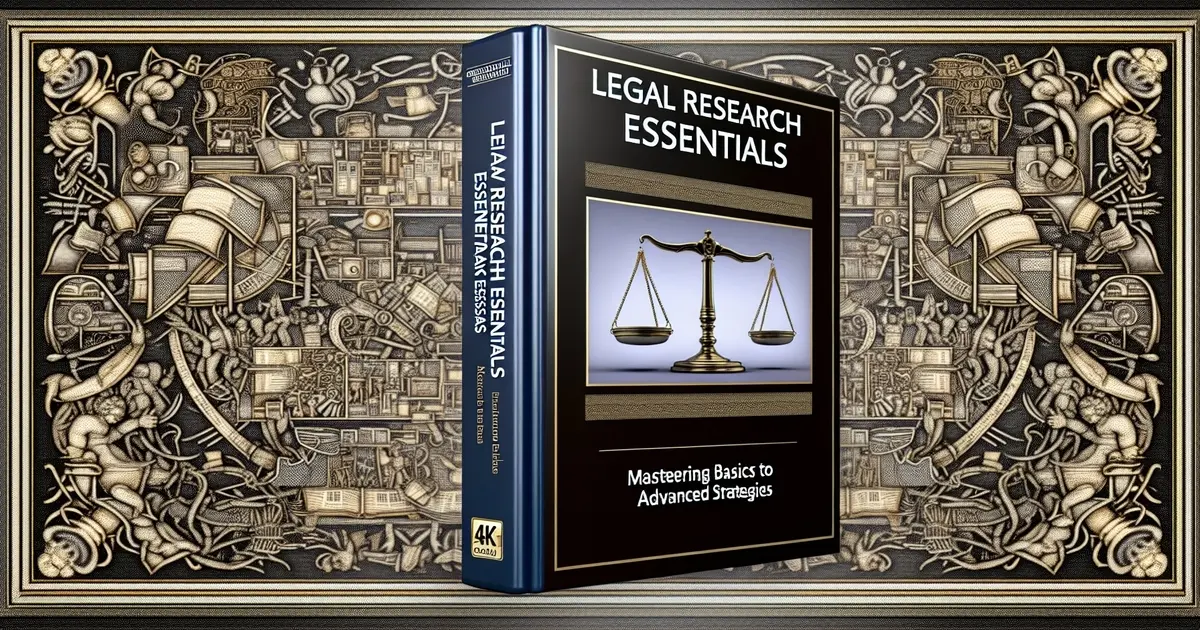Legal Research Essentials: Mastering Basics to Advanced Strategies
Did you know that many legal professionals admit to facing challenges during legal research? It's not just about digging through hefty law books on legal topics anymore; it’s an art and science combined, requiring sharp skills and the right tools to rule effectively. Whether you're a seasoned lawyer or a curious newcomer stepping into the complex world of legal studies, mastering legal research is non-negotiable to rule the courtroom and support your arguments; every minute and second counts.
This blog post is your flashlight in the dark maze of statutes, case laws, and legal precedents. We'll slice through the jargon, offering practical tips and strategies to enhance research efficiency. So grab your notes (and maybe a strong coffee) because we’re about to dive deep into making your journey through legal research less daunting and more productive.
Table Of Contents
Understanding Legal Research
Purpose Defined
Legal research is the process of finding answers to legal questions. It involves looking at laws, court decisions, and other legal documents. This research helps lawyers understand the law better.
The main goal is to find information that supports a legal argument or decision. Lawyers use this research in court cases and when advising clients. It's a critical part of their job.
Academic vs Professional
There are two main types of legal research: academic and professional.
Students or professors do academic research. They look into legal theories or historical cases for education purposes. This type often appears in articles or textbooks.
Professional research is different. Lawyers do it to solve real-world problems for their clients. They look for current laws and recent case outcomes that apply directly to their cases.
Each type has its goals, but both require a thorough understanding of the law.
Skills Needed
Effective legal research requires several essential skills.
- Analytical thinking helps researchers understand complex laws.
- Attention to detail ensures they get all vital information.
- The organization lets them keep track of all the data they find.
Here are some steps involved in doing good legal research:
- Identify the problem you need to solve.
- Find relevant sources like statutes, case law, and secondary sources.
- Evaluate those sources critically.
- Organize your findings.
These skills take time and practice to develop but are essential for success in any area of law.
Importance of Legal Research
Supporting Arguments
Legal research plays a critical role in building strong legal arguments. Lawyers rely on this process to find relevant laws, cases, and statutes that support their case. It's like gathering the right tools before building something meaningful.
For example, attorneys search through previous court decisions to find precedents when preparing for a trial. These precedents help them predict how the court might interpret their case. Without thorough research, lawyers could miss crucial information that could strengthen their argument.
Staying Updated
The law is constantly changing. New rules are passed, and courts make new rulings every day. For legal professionals, staying updated with these changes is not just beneficial; it's necessary.
Consider tax law as an example. Tax codes can change yearly, affecting businesses and individuals differently each time. A lawyer specializing in tax law must keep abreast of these changes to provide accurate advice to clients or prepare defenses against tax-related charges effectively.
Impacting Outcomes
The outcome of legal cases often hinges on the quality of legal research conducted by the involved parties' attorneys. Good research can lead to winning strategies significantly in a client's life or business.
Let’s look at two scenarios:
- In personal injury cases: Detailed research into similar past cases can help estimate potential settlements accurately.
- In intellectual property disputes, Finding prior art or previous patents similar to those in dispute can be pivotal for the case outcome.
In both examples, thorough legal research directly influences advice given to clients and strategies developed for litigation or negotiation.

Legal Research Process and Strategies
Identifying Issues
The first step in the legal research is pinpointing the exact legal issue. This requires a clear understanding of the facts at hand. Lawyers often start by asking questions. They want to know what happened, who was involved, and where it occurred.
Once they have this information, they can define the problem more clearly. This helps them focus their research on relevant laws and cases.
Finding Laws
After identifying the issue, the next step is to find applicable laws. Researchers use various tools for this task. These include law libraries, online databases, and legal journals.
They look for statutes that might apply to their case. They also search for previous court decisions related to their issue. This helps build a solid legal argument.
Analyzing Cases
Analyzing relevant cases is crucial in legal research. Researchers study how courts interpret laws in similar situations. This provides insights into the potential outcomes of current cases.
They pay close attention to details like:
- How judges reasoned
- What evidence was considered significant
- The final judgment
This analysis forms the backbone of any legal argument.
Systematic Approach
A systematic approach ensures thoroughness in research. It involves:
- Clearly defining your question
- Searching systematically across multiple sources
- Evaluating each source's relevance and reliability
- Organizing findings logically
Such an approach minimizes errors and oversights.
Efficient Strategies
Efficient strategies save time without compromising quality. Some effective methods include:
- Using advanced search options in databases
- Keeping track of keywords that yield good results
- Creating summaries of key findings from each source
These strategies help researchers stay organized and focused.
Types of Legal Information
Statutes and Case Law
Statutes are laws passed by legislatures. They are primary sources of law. For example, the U.S. Congress passes federal statutes. These laws apply to everyone in the country.
Case law comes from court decisions. Courts interpret statutes and set legal precedents through their rulings. This is also a primary source of law but differs because it evolves with each new case.
Finding authoritative statutes involves looking at government websites or official legal publications. For case law, reliable sources include published court opinions and legal databases like Westlaw or LexisNexis.
Regulations
Regulations are rules made by executive agencies based on statutes. They detail how the broad principles of the law will be applied in specific situations.
They hold great importance in areas like environmental law or health care regulations where detailed guidance is needed beyond what's provided in statutes.
To identify authoritative regulations, one should consult official government publications or websites such as the Federal Register for federal regulations.
Secondary Sources
Secondary sources offer analysis, commentary, or a restatement of primary law and can be crucial for understanding complex legal principles.
Examples include legal encyclopedias, treatises, and journal articles, which provide insights into how laws have been interpreted or might be applied in future cases.
While not legally binding, secondary sources can guide the finding of relevant cases, statutes, and regulations by pointing researchers toward key issues and authorities.
Understanding these different types informs every aspect of legal research, from identifying relevant laws to interpreting complex judicial decisions.
- Recognizing whether you need a statute, regulation, case law decision
- Knowing where to find these resources efficiently
- Understanding their relevance to your research question
Starting Legal Research Basics
Identifying Issues
Identifying the legal issue is crucial. It's like finding the right question before seeking answers. This step shapes your entire research journey.
First, understand what you're dealing with. Is it a dispute over contract terms? A question about property rights? Recognizing the core of your legal dilemma narrows down vast fields into manageable topics. Next, frame your issue clearly and concisely. This clarity guides you through complex legal landscapes.
Selecting Resources
Choosing the right resources is critical. Not all tools are created equal.
Start with primary sources for direct law insights—statutes, regulations, case law. They offer unfiltered access to legal principles governing specific issues or areas like circuit decisions impacting regional norms. Secondary sources come next; they interpret and analyze laws in journals or treatises, providing a more profound understanding but not raw law itself.
- Use libraries (physical or digital) for comprehensive collections.
- Online databases speed up locating relevant documents.
Both approaches have pros and cons:
- Libraries offer hands-on help but can be time-consuming.
- Digital databases provide quick searches but may require subscription fees.
Keyword Techniques
Effective keyword selection transforms research from frustrating to fruitful.
Brainstorm keywords related to your topic before diving into databases. Think broader than specific terms; include synonyms and related concepts that could yield valuable results.
- For instance, consider "lease agreements," "rental disputes," etc., as additional search terms if researching tenant rights.
Then refine using Boolean operators (AND, OR, NOT) for precise results:
- AND narrows searches by combining terms (e.g., lease AND agreement).
- OR expand the search scope to include similar concepts (tenant OR renter).
- NOT excludes unwanted results (rights NOT owner).
This strategy ensures thorough coverage of potential resources while saving time by excluding irrelevant information.
Utilizing Secondary and Primary Sources
Secondary Sources
Secondary sources play a crucial role in legal research. They provide context and background to the topic at hand. These sources include books, articles, encyclopedias, and legal digests that summarize and explain the law.
Using secondary sources helps researchers understand complex legal principles. For instance, a law review article can offer insights into how courts interpret specific laws. This understanding is vital before diving deep into primary sources.
Evaluating Reliability
Not all primary sources are created equal. It's essential to evaluate their reliability carefully. When searching for primary sources like statutes, court opinions, or regulations, look for documents directly related to your case or issue.
Criteria for evaluating the reliability of these documents include:
- The authority is issuing the document.
- Its relevance to your research question.
- The date it was published or updated last.
For example, a recent Supreme Court opinion would be highly reliable in researching constitutional issues.
Cross-referencing Sources
Cross-referencing between secondary and primary sources is the best practice in legal research. This method ensures accuracy and depth in understanding the law.
Start with secondary sources to get an overview of your topic. Then, move on to primary sources for specific facts and instances supporting your argument or thesis.
To cross-reference effectively:
- Note down relevant citations found in secondary materials.
- Search these citations in databases of primary resources.
- Compare findings from both sets of materials for consistency.
This process might take minutes following each lead, but it is invaluable in building a solid foundation for any legal argument or analysis.
Ensuring Use of "Good Law"
Verification Methods
The next step is verifying their validity after identifying relevant laws and precedents using primary and secondary sources. This process ensures that your arguments are based on sound law, meaning they are still enforceable and have yet to be overturned or deemed obsolete.
Legal databases are one effective way to verify a law's status or precedent. These platforms often provide features that indicate whether a case has been overruled, affirmed, or questioned in subsequent rulings. For example, when researching a landmark case, these tools can show if it's still considered a good law by displaying flags or warning symbols next to the citation.
Another method involves checking statutory changes directly from government websites. Legislatures frequently update their online resources with new bills passed and amendments made to existing laws. Researchers can stay informed about changes affecting their area of interest by regularly visiting these sites.
Available Tools
Several tools have been developed specifically for checking citations and legal standing to streamline the verification process—these range from comprehensive legal research databases to more straightforward citation checkers.
- Legal Research Databases: Platforms like Westlaw and LexisNexis offer extensive libraries of legal documents along with tools for checking the validity of cases and statutes. They use advanced algorithms to alert users about developments affecting their cited authorities.
- Citation Checkers: Simpler than full-fledged research databases, citation checkers focus solely on ensuring up-to-date references. They quickly scan citations in a document against current law databases to identify any discrepancies.
Both types of tools play crucial roles in maintaining the accuracy of legal documents.
Importance
The need for up-to-date information must be balanced in legal arguments. Laws evolve constantly as societies change; what was applicable yesterday might not hold today. Refrain from relying on outdated information to weaken your argument significantly or lead to unfavorable client outcomes.
Moreover, presenting well-researched arguments based on valid laws demonstrates professionalism and diligence—qualities highly valued in the legal profession.
By incorporating modern verification methods into your research routine:
- You ensure reliability.
- You protect your credibility as a lawyer or researcher.
- You contribute positively towards achieving justice by basing decisions on accurate information.

Challenges and Skills Development in Legal Research
Common Obstacles
Legal research often feels like navigating through a dense forest. One major challenge is information overload. Researchers are buried under countless sources, struggling to identify what's relevant.
To tackle this, setting clear objectives before diving into research helps. It acts as a compass, guiding you through vast information landscapes. Remembering the importance of using "Good Law" from our previous section is crucial here, too. It ensures that your findings are extensive but also accurate and up-to-date.
Essential Skills
Developing specific skills makes overcoming obstacles more manageable. Critical thinking stands out as an essential skill in legal research. It allows researchers to analyze information critically, questioning its relevance and credibility.
Another vital skill is attention to detail. In legal documents, every word matters. Missing a single detail can lead to incorrect conclusions or recommendations.
Let's break down how these skills help:
- Critical thinking enables you to sift through massive amounts of data efficiently.
- Attention to detail ensures that the information you rely on is thoroughly vetted for accuracy.
Continuous Learning
The legal field constantly evolves, with new laws and interpretations emerging regularly. This means continuous learning isn't just beneficial; it's necessary for anyone involved in legal research.
Engaging regularly with current legal publications keeps your knowledge base fresh and relevant. Participating in workshops or seminars on advanced research techniques can also significantly enhance your abilities. Here are two ways continuous learning impacts your work:
- Staying updated on new laws prevents reliance on outdated or overturned precedents.
- Advanced techniques streamline the research process, making it more efficient and effective.
Documenting and Organizing Legal Research
Efficient Documentation
Efficient documentation is critical in legal research. It helps you track your findings and supports your arguments. Start by writing down all relevant information from cases, regulations, and annotations. This might include important dates, names, or outcomes.
One technique is to create a summary for each document you review. Include the main points that relate to your client's matter. This makes it easier to find specific details later on. Use bullet lists for quick reference:
- Dates
- Key parties involved
- Relevant laws or regulations cited
- The outcome of the case
Organize these summaries in a logical order. You could group them by theme or relevance to the client's issue.
Organizing Information
An organized system saves time and reduces stress when looking for information later. Categorize documents based on their type or relevance to different aspects of the case.
Create folders for each category:
- Case law
- Statutes and Regulations
- Client Communications
- Miscellaneous Documents
This structure lets you quickly access what you need without sifting through unrelated documents.
Another part of the organization involves keeping track of legal updates or changes that could affect your case's outcome. Flags can help here. Software tools like Clio Manage offer features that assist with this task. They allow users to set alerts for new developments related to their matters.
Software Tools
Utilization of software tools is crucial in managing large volumes of legal data efficiently. These tools support researchers by offering features explicitly designed for legal work. For instance, they often include options for annotating documents directly within the platform. This means you can add notes about why a particular regulation is relevant right next to it.
Some popular software options are:
- LexisNexis: Offers extensive databases covering various jurisdictions along with analytical tools.
- Westlaw: Known for its comprehensive search capabilities and integration with other Thomson Reuters products.
- Clio Manage: Helps manage clients' matters, including documenting research findings effectively.
These platforms also provide ways to share findings easily among team members, which enhances collaboration on complex cases.
Summary
Diving into legal research can feel like navigating a labyrinth, but you have the map now. From understanding its importance and grasping the process to mastering primary and secondary sources, you can tackle any legal query head-on. Remember, ensuring you're on the right track with "Good Law" and organizing your findings are your keys to success. Legal research isn't just about finding answers; it's about honing skills to make you a sharper thinker and a more persuasive communicator.
So, what's next? Take this knowledge for a spin. Start with a question that piques your curiosity or challenges your understanding. Dive deep, apply these strategies, and see where your research takes you. Who knows? You might uncover something groundbreaking. Ready to become a legal research pro? The ball's in your court.
Frequently Asked Questions
What is legal research?
Legal research is like detective work for the law. It involves finding and understanding legal information to support legal decision-making, whether you're preparing for a case or writing a legal opinion.
Why is legal research necessary?
Imagine building a house without a blueprint—that's what skipping legal research in law practice would be like. It lays the foundation for informed decisions, ensuring advice and arguments are backed by solid evidence.
How do I start my legal research?
Are you diving into legal research? Start with the basics: pinpoint your issue or question. Think of it as setting your GPS destination before hitting the road—it guides where you look and what you're looking for.
Can I use Google for legal research?
Yes, but think of Google as your appetizer, not your main course. It's great for an initial overview or finding secondary sources, but always double-check facts with authoritative primary sources.
What’s considered "good law"?
"Good law" refers to current and valid laws or judicial decisions that haven't been overturned or invalidated. Picture it as milk with a future expiration date—still fresh and suitable to use!
How do I know if my source is reliable?
Reliable sources are like gold in legal research—they’re valuable and trustworthy. To ensure accuracy, look for publications from reputable institutions, government websites, or peer-reviewed journals.
What challenges might I face in legal research?
Imagine navigating through a maze blindfolded—that's sometimes what searching through vast amounts of complex information feels like during Legal Research! Challenges include overwhelming data volumes and keeping up-to-date with constantly changing laws.
Related Post
Mediation Services
Have you ever found yourself in a sticky situation where every conversation, especially about news, phone changes, or specific needs, feels like walking on eggshells?
Read MoreDocument Drafting
Did you know that a whopping 90% of professionals struggle with document drafting, writing drafts, and revision at some point in their careers as writers?
Read MoreRepresentation in Court
Navigating the maze of legal battles, the concept of representation in court, including substitute counsel and representative roles during a trial before a magistrate judge, has evolved significantly from its rudimentary origins.
Read MoreLegal Consultation
In a world where legal dilemmas can spring up as unexpectedly as a pop quiz, understanding the ins and outs of legal consultation, prospective attorney selection, alternative dispute resolution, and the chances of achieving justice have never been more crucial.
Read MoreLegal Services
Why settle for less? Finding the proper independent nonprofit support can make all the difference between success and addressing legal problems and stumbling blocks.
Read More





